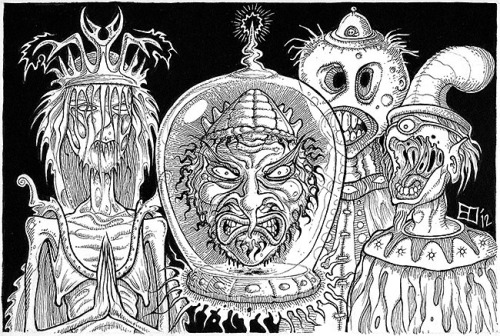As I mentioned in an earlier post, outside circumstances helped me with this, but it was still tricky to sit and wonder if the wheels were going to come off at any moment. I really do love this odd-ball hobby and I was keen to see other people give it a shot.
It's a quixotic dream of course ... much of what made tabletop role-playing so magical was not the strangeness of Erol Otus's art, the simple clarity of Tom Moldvay's prose, or even the evocative power of David Trampier's Monster Manual work ... those were all great of course ...
... but no, it was the fact that D&D came like a bolt out of the clear blue sky to invade a world where we had only four and a half TV stations, where Fantasy was not really its own genre yet (but just an awkward subset of Science Fiction), and where fantasy artwork was largely limited to Prince Valiant strips that ran in the comics section of the Sunday paper.
 |
| pic from guttergeek.com |
Without being present at their tables, I was largely dependent on the written feedback of my neophyte GMs to know how things were progressing. Here's some of what they had to say:
"I think having a map on the folder and then sketching a map [for the players] was a good idea because the players didn't get to see what was actually going on in the map."
"The tool I used most was the information card telling the stats of each monster."
"As GM I got to make it up as the game went on."
"The hardest part was getting everyone to stay focused and not have side conversations."
"The most important tool for running the game was the map. The most important skills for running Dagger are being able to do mental math and being creative."
"I was nervous about [whether] they wouldn't be paying attention since I am not a teacher."
"The monster stats helped a lot. I used that card all the time."
"I had more fun as I GMed, because I was able to create the game ... the game went faster than I expected."
"The game taught communication, teamwork, paying attention, and thinking about what you do, because there could be consequences."
"The best part was watching when someone died and everyone freaks out."
These comments, and the fact that utter chaos didn't swallow my classroom, provided assurance that my methods were having at least some of the impact I was hoping for.
 |
| accessed here ... now you must get the tattoo |

No comments:
Post a Comment